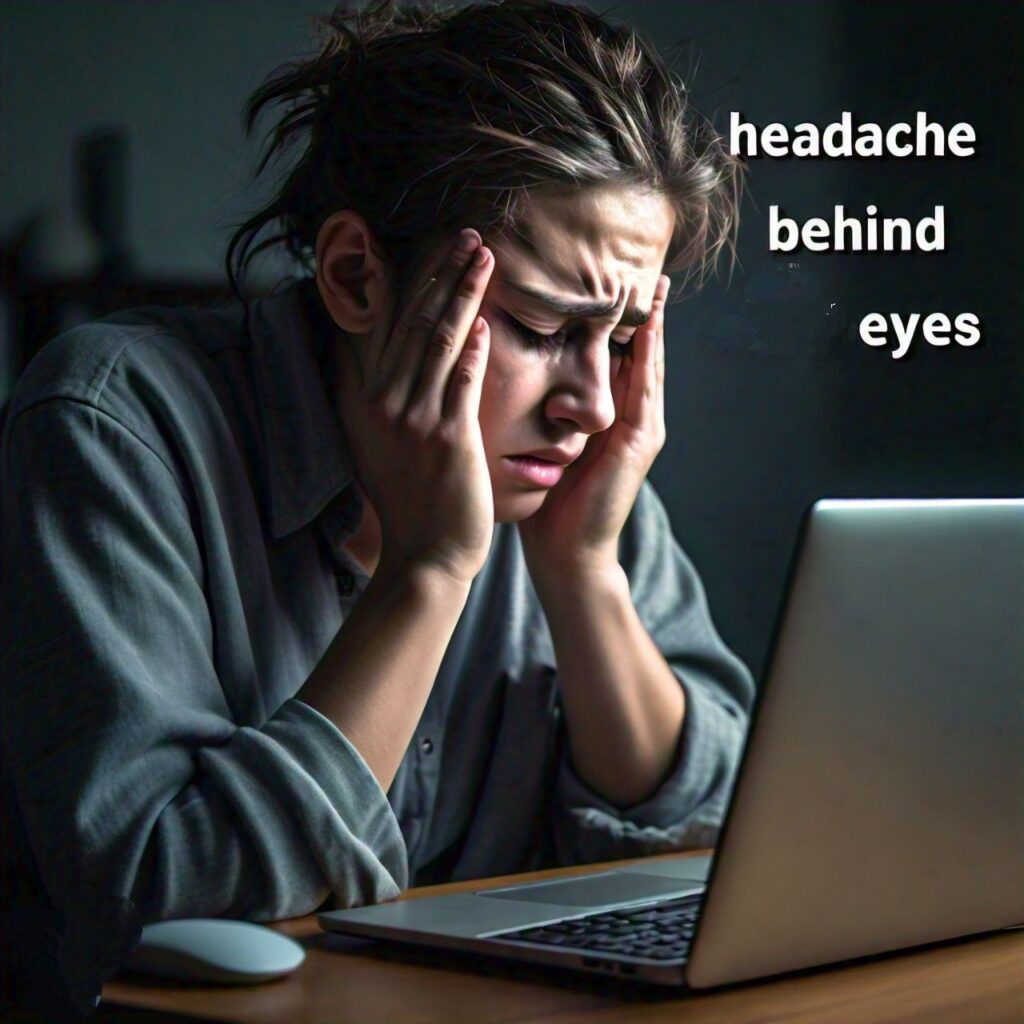Headache behind the eyes : it’s symptoms, and 10 remedies to cure
Headaches may be severe, and when they strike behind the eyes, they can be very disturbing. The sense of pain or pressure in this sensitive area can disrupt everyday activities, sleep, and overall well-being. If you’re having headaches behind your eyes, it’s critical to identify the various causes and investigate effective alleviation options.
What causes headaches behind the eyes?
Headaches behind the eyes can result from a variety of causes, including
- Tension and Stress: Tight muscles in the face, neck, and scalp can cause pain in the area behind the eyes.
- Sinus Pressure: Pain and pressure behind the eyes might be caused by sinus inflammation or infection.
- Eye Strain: Excessive screen time, bad posture, or wrong eyeglasses can cause eye fatigue and headache.
- Migraines: This neurological condition can produce severe throbbing pain behind one or both eyes.
- Cluster Headaches: These severe headaches typically occur behind one eye and may be accompanied by tears and redness.
- Dry Eyes: Insufficient tear production or poor eye hydration can cause discomfort and pain.
- Allergies: Seasonal or environmental allergies may cause nasal pressure and headaches.
- Dehydration: Inadequate fluid intake might result in headaches, notably those behind the eyes.
- Hormonal Changes: Headaches can be caused by fluctuations in hormone levels during menstruation, pregnancy, or menopause.
- Underlying Medical Conditions: Glaucoma, multiple sclerosis, and thyroid diseases can all result in headaches behind the eyes.

Symptoms and characteristics:
Headaches behind the eyes can present in various ways depending on the underlying cause. Common symptoms include:
- Pain might be dull or acute.
- Pressure or pounding sensation.
-redness in eyes - tears in eyes
-blurred vision
-light sensitivity
-eye fatigue or dryness. Relief Strategy:
While it is critical to check with a healthcare professional for correct diagnosis and treatment, consider the following alleviation strategies:
- Stay Hydrated: Drink enough of water to keep your eyes hydrated and overall healthy.
- Eye Care: Please follow this highly effective rule: every 20 minutes, glance away from screens and focus on anything 20 feet away for 20 seconds.
- Relaxing name Techniques: Practice stress-reduction activities like as meditation, deep breathing, and yoga.
- Cold or warm compresses: Use a compress to relieve tension and pain in the afflicted area.
- Over-the-Counter Pain Relievers: For light headaches, try acetaminophen or ibuprofen.
- Prescription Medications: Consult a doctor about prescription choices such triptans or ergotamines.
- Lifestyle Changes: Stick to a steady sleep pattern, avoid triggers, and get regular exercise. Natural remedies: Consider these natural therapies to supplement your relief strategy:
- Peppermint Oil: Use topically on the temples or inhale to relax.
- Ginger: To reduce inflammation, drink ginger tea or take ginger pills.
- Feverfew: This herbal medication could help lessen migraine frequency.
- Acupuncture: This ancient treatment may help relieve stress and pain. When To Seek Medical Attention: If you’re experiencing:
- Sudden and severe headaches.
- Vision alterations, or double vision
- Eye discomfort or redness.
- Fever or disorientation.
- Chronic or intensifying headaches. Conclusion:
Medical Treatment:
- Pain Relievers: Over-the-counter pain relievers such as acetaminophen (Tylenol) or ibuprofen (Advil, Motrin) can help with mild to moderate headaches. 2. Triptans: Migraine drugs such as sumatriptan (Imitrex) and rizatriptan (Maxalt).
- Ergotamines: Prescription migraine drugs that include ergotamine (Ergomar) and dihydroergotamine (Migranal).
- Anti-nausea medications: Used to treat severe headaches that are accompanied by nausea and vomiting. 5. Corticosteroids: Used to decrease inflammation in sinus-related headaches. Natural remedies:
- Stay Hydrated: Drink plenty of water to avoid dehydration.
- Rest and Relaxation: Get enough sleep and use stress-relieving practices.
- Cold or warm compresses: Place on the forehead, neck, or eyes.
- Herbal Teas: Feverfew, ginger, or peppermint tea might help relieve headache symptoms.
- Aromatherapy uses essential oils such as lavender, eucalyptus, and peppermint.
- Acupuncture: Acupuncture points can help reduce tension.
- Massage Therapy: Gentle treatments for relaxing facial and neck muscles. Lifestyle Changes:
- Keep a consistent sleep schedule.
- Exercise regularly.
- Eat a Balanced Diet.
- Avoid Triggers: Recognize and avoid triggers such as specific foods, stress, or environmental conditions.
- Practice good posture.
- Limit screen time.
- Stress management techniques include meditation, yoga, and deep breathing exercises.
Home Remedies:
- Warm bath or shower.
- Eye Massage: Gently massage your eyes and surrounding areas.
- Cucumber slices: Apply to the eyes to minimize puffiness.
- Herbal eye drops, such as chamomile or calendula.
- Apply ginger paste to the forehead and temples. Alternative therapies:
- Chiropractic care involves spinal manipulation and adjustments.
- Reflexology: A technique that uses pressure points on the feet or hands.
- Biofeedback Therapy: Learn to notice and control body responses.
- Hypnosis involves guided relaxation and visualization techniques. When To Seek Medical Attention:
- Sudden and intense headaches.
- Vision changes, including double vision.
- Eye pain or redness.
- Fever or confusion.
Prevention:
- You should regularly checkup your eyes
- You should note headache problem
- Triggers should be avoided
- Stress management should be practices
- Drink plenty of water ,hydration reduces eyes discomfort
Conclusion
Headaches behind the eyes can be upsetting, but recognizing the causes and looking into remedy options can help ease symptoms. You can lessen the frequency and intensity of these headaches by living a healthy lifestyle, using relaxation techniques, and getting medical assistance as needed








